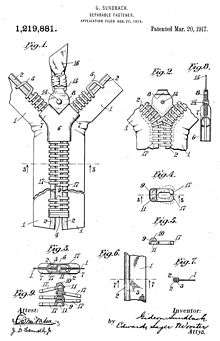Talon Zipper

Talon Zipper is a company founded in 1893, originally as the Universal Fastener Company, in Chicago. They later moved to Hoboken, New Jersey, and finally to Meadville, Pennsylvania. It was in Meadville that the zipper as we know it was invented, until then they were producing hookless fasteners for boots and shoes. Here, the zipper was mass-produced beginning in the 1920s. The high demand for zippers created favorable conditions for the Talon Company, and so became Meadville's most crucial industry. The company encountered significant difficulties after it was sold to Textron industries in 1978, eventually ending up bankrupt. Today, nothing remains of Talon in Meadville except for a few run down buildings. However as a result of the need for close tolerances and tool and die makers, a cottage industry of tool and die shops was established which resulted in Meadville being nicknamed Tool City with more tool shops per capita than any place else in the United States. Other early names included the Automatic Hook and Eye Company, and the Hookless Fastener Company.
Talon was the first zipper manufacturing company, and flourished through the 1960s when it is estimated that seven out of every 10 zippers were Talon zippers [New York Times 12/7/1981]. Its decline began with Textron's acquisition and by 1981 its market share had fallen to 35% as a Japanese company, YKK, was able to produce zippers more cheaply. The company was sold in 1981 to Nucor Holdings for 66 million dollars and production was shifted to Mexico, but to no avail, and it was sold to private Mexican investors. In 1996 it was acquired by Tag-It Pacific, a company based in California, which changed its corporate name in 2007 to Talon International, Inc., and shifted production to Asia in an attempt to restore the company's fortunes.